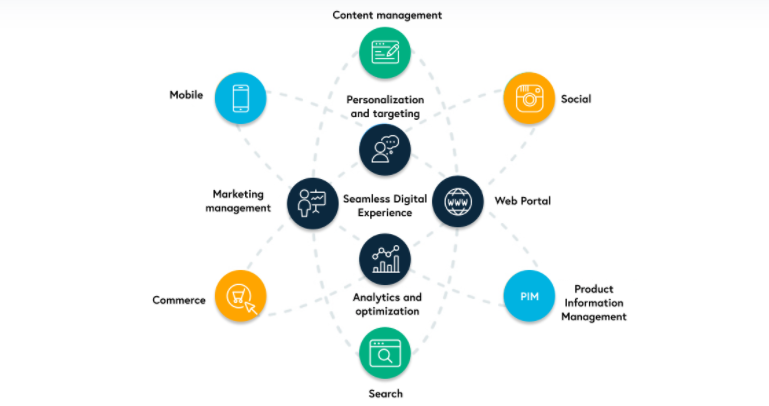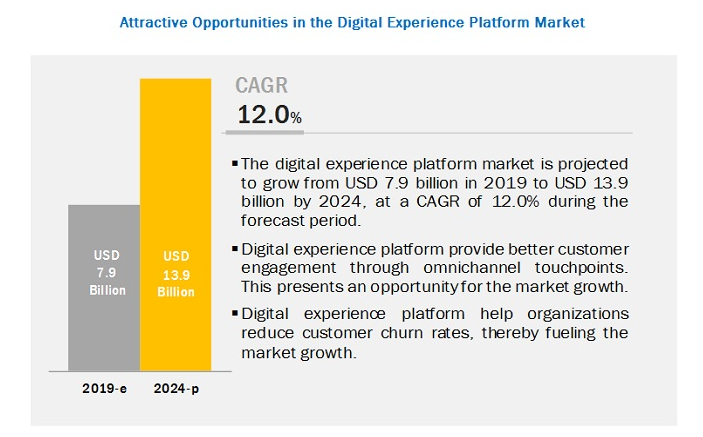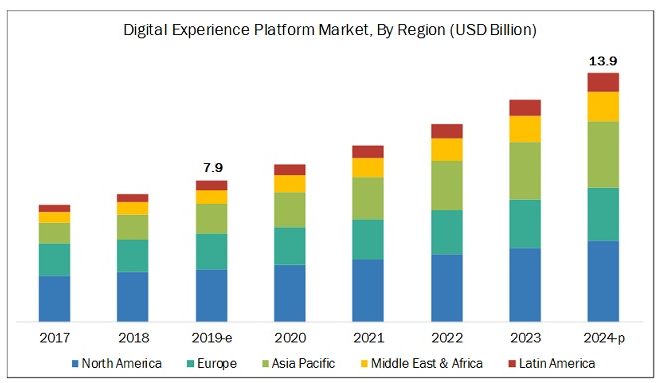
Upgrade Your Drupal Skills
We trained 1,000+ Drupal Developers over the last decade.
See Advanced Courses NAH, I know EnoughEverything You Need To Ask Yourself Before Choosing the Ideal DXP
If there is one thing that is in abundance today, that’d be competition. It starts as soon as a child is born and ends when he takes his last breath. It’s not just people who have to face the gruelling reality of perpetual competitiveness, it’s also the non-living objects who compete.
Tell me, can you possibly buy the new Adidas Aerobounce 2 without checking what the competitors have to offer? And can you really buy that shoe without comparing the prices on the online and offline stores? I am sure not.
This is why brands and businesses try to be the best in catching the eye of the consumer and presently the best way to do that and beat the competition is through Digital Experience Platforms.
Today’s consumer doesn’t connect to a business through medium, there are a number of touchpoints in play and integrating all of those together to engage your consumer base is what a DXP does. This helps businesses to not only build and deploy digital experiences, but also improve them continuously across your websites, portals and mobile applications. All of it accumulating to a wholesome user experience.

The diagram above is the sum total of a DXP’s powers, which are pretty versatile, as it combines all of the various aspects of online businesses, be it social media or personalisation and targeting, and lets you deliver a seamless digital experience.
Digital Experience Platforms provide an edge to a business that CMSs and WEMs cannot and that is why they are becoming popular by the day. Their advantages back this claim.
- The ability to manage the bazillion consumer touchpoints is the paramount merit, be it FAQs or chatbots, there is an answer to everything.
- Then is the ability to connect your business’ various aspects at one place, from sales and commerce transactions to instilling loyalty amongst the consumers through in-house programs.
- The ability to be flexible is inherent in DXPs as well. You can build it on your rhyme and rhythm, there won’t be any objections.
Let me also give you a few statistics to understand the rage DXPs are becoming in the present and what their future looks like.


Based on these figures, I have to ask, when are you switching to a DXP? If the answer is right about now, you have landed yourself in the right place because I am going to be talking about all the things you would have to consider before choosing the right and most suitable DXP. So, let’s begin our DXP checklist.
What tools and integrations are you using and plan to use?
The foremost question to ask relates to technologies you are using and plan to use in the future. You can document these technologies based on your consumer’s journey. This would allow you to create the most optimal digital experience for your users because you would have worked on the gaps and weaknesses of the journey.
From that first step, you have to move onwards and upwards and focus on all the tools and integrations you would need to work with your chosen DXP. Let’s take a look at them together.
Data Analytics
Every organisation has a data warehouse, however, it’s proportion does vary. This data might as well be responsible for shaping your strategy. Therefore, you have to consider your analytical requirements before taking on a DXP.
Remember that you can always come to Google Analytics for any analytics, even after choosing a closed DXP. To know more on how data driven strategies can help understand consumer behaviour, read here.
Digital Marketing Tools
The DXP you choose should be able to integrate with various marketing tools in the market. Look for integration support with a keen eye, it could be out-of-the-box or an extension, but it has to be there with a side of third-party marketing automation at play.
Conducting a thorough review of the MarTech stack is also recommended here, find out what is being used and where it is being used before going any further.
Digital Asset Managers
If you have a digital asset manager, you should consider one thing and that is its integration with other downstream systems. This would ease the flow of images and assets through your organisation. Everything about digital asset management (DAM) here.
Backend Integrations
Then is the question of backend integrations, you could have a CRM or an EPR working at your backend. If that is the case, you ought to start finding them out and assess their compatibility with your DXP provider.
What are your notions about decoupling?
Nobody likes being constrained, the joy you find when you are free to do as you want is unlike anything else. That is pretty the scenario with decoupling or going headless. You could have a strong monolithic architecture now, but in the future that could change, because what works today may not work tomorrow. Therefore, you should think about choosing an Open DXP, if you are indecisive about decoupling today.
Your projects could need microcontent;
Your content could need to be published on multiple channels;
Your developers could ask to go headless because there is so much to explore;
All of these scenarios are real possibilities and you must consider them before making firm decisions on decoupling and DXPs. There are plenty of these platforms that support going headless and having that room to explore can’t be bad.
What are your plans for commerce?
Commerce is another important aspect you need to consider before choosing a DXP. Having all the right features to look for is crucial here. You have to ensure that the DXP’s commerce strategy actually aligns with your commerce needs and at the same time gives you room to be better.
- Assess yourself first, know whether your needs are just browse and buy or are they more than that.
- Assess whether the DXP should be able to work with different commerce technologies to get you what you want.
- Assess your Stock Keeping units and let their count decide the kind of robustness you would need in your DXP.
- Assess the kind of data model you need based upon the working of your team and its present and future needs.
- Assess the importance of content in commerce, more like search it up and integrate it without any hesitation. This would create a much more effective experience for the user.
- And assess whether going headless is worth losing the commerce extensions that come along with the platform.
Once you have an answer to these, you’ll become a step closer to the perfect DXP for you.
What are your editorial needs?
After technology, comes the part your content writers and editors play in the DXP decision. You have to understand that the more writers and editors you have, the more complex the editing experience would become and you would need a DXP that can handle it.
In this regard you have to consider three things before making a decision.
Cache Manipulation
Cache manipulation features allow you to sync your developers’ caching strategies with the user's needs. This helps in making you content appear quickly to the users and a perpetual communication in your cache layers.
Review Needs
Sometimes your content needs to be reviewed by people within the organisation before it goes live. These could be your legal department or even project managers. If that is the case, you need to look for a DXP that is equipped to handle this kind of editorial needs.
Multilingual Requirements
Finally, many sites today are operating globally, this means they have to change to the local language. For that your DXP needs to have impeccable translation needs, with understanding of the various dialects of the said language. You can’t be using American English on a Scottish website, it won't be wrong or unethical, just inappropriate and your audience might not be able to relate.
What is the value of security for you?
Security is another major criteria that has to be given its due importance. Making a fully-functional site with all the right features, but lack of security would make all your efforts go in vain. That’s why you have to look for the right security features in a DXP to avoid the unfortunate fate.
- The foremost feature to want should be an integration to Varnish and a CDN along with free-flowing interactions between the DXP and cache layers.
- Then you should think about securing your network nodes that are outside your network core. This is done through edge protection services provided by top DXPs, so make that a mandate.
- Distributed Networks Attacks can be quite harmful, so ensure that the DXP you choose can prevent and counter them.
Also remember that you need to let the experts do the decision making in this regard because you cannot afford to go wrong here.
What about government regulations and stipulations?
There are a number of rules and regulations that your digital experiences have to adhere to with a super glue consistency. A DXP that makes that easy for you is always going to be a winner; you must know what happens when you go against the law.
Here are the paramount regulations that you have to stick to.
- Americans with Disabilities Act or ADA;
- General Data Protection Regulation or GDPR;
- Health Insurance Portability and Accountability Act or HIPPA;
- Family Education Rights and Privacy Act or FERPA;
- Web Content Accessibility Guidelines or WCAG;
These are a must when building digital experiences, so grill your prospective vendors about them and if possible, ask for case studies.
Apart from this, Personally Identifiable Information should be a factor in your choice. The way it is collected and stored should be compliant with the GDPR regulations.
What are the financial implications?
When you would be looking for a DXP, you will certainly want one that will favour all the technologies that you want to incorporate into your organisation’s digital platforms. Am I right? So, you will be aiming for the best out there. However, what if the best is not within your price range. Do you settle then? No, of course not. You choose what is the most suitable for you and whatever ticks the most boxes.
So, before or even during the selection process of a DXP, you need to allocate the budget you are comfortable with. It could be less than a hundred grand or close to a million dollars, that is on you.
Remember that just because a DXP is expensive, doesn’t mean it is the best. Whatever your budget may be, you could still get what is best for you.
Finally, what do you want the future to hold for you?
Life is often regarded as transitory and it really is; what is important today may not be important in future and what may seem trivial today may become the next big thing.
The same is true for DXPs and your digital experiences; they will evolve with time. Therefore, when you choose an agency remember to not let it make you inflexible. You would need to keep an open mind about the future and your digital experiences should have the same openness in their build.
- Look for future scope in the DXP;
- Look for extension of current technologies like marketing automation;
- Look for an open DXP architecture with flexible APIs.
You certainly cannot be sure of the future, but what you can be sure of is the fact that the future is going to change and you would have to change with it.
Bottom Line
As Steve Jobs said,
“You’ve got to start with the customer experience and work back towards the technology- not the other way around.”
There is real meaning behind that statement, all of your digital experiences start with and end with the consumer, so why not prioritise them over everything else.
So, how to choose a DXP? By assessing your past, present and future in accordance to your consumer experiences. You must want to create a fulfilling digital experience for your users, for that you have to have a fulfilling digital experience platform that guarantees to check every and all of your necessities. The questions I talked about above would help you kick start your DXP journey. OpenSense Labs continues to build amazing digital experiences with Drupal that endeavor to provide all of what we discussed, so you could, maybe, start looking here to build a Drupal-powered DXP.
About Drupal Sun
Drupal Sun is an Evolving Web project. It allows you to:
- Do full-text search on all the articles in Drupal Planet (thanks to Apache Solr)
- Facet based on tags, author, or feed
- Flip through articles quickly (with j/k or arrow keys) to find what you're interested in
- View the entire article text inline, or in the context of the site where it was created
See the blog post at Evolving Web

